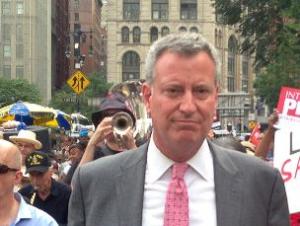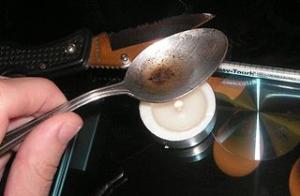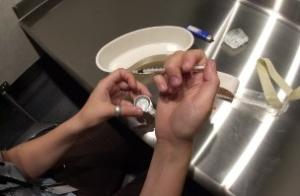New York City remains the world's marijuana arrest capital, and it's still mainly black and brown people getting popped.
The 2017 International Drug Policy Reform Conference is the major biannual gathering of drug policy reformers from around the world.
Interest in the medical marijuana industry is high in North Dakota, Hawaii gets its first two dispensaries, New Jersey ponders expanding qualifying conditions, and more.
A Texas parole officer gets popped for getting pills from a parolee, a pair of California deputies get their hands slapped for stealing and reselling weed, a Texas jail guard gets nailed for collecting drug debts for a prisoner, and more.
A new poll shows extremely low support for marijuana prohibition, Maine lawmakers want to restrict how much pot landowners can allow for personal grows, drug deaths are up dramatically in the UK, and more.
Attorney General Sessions is giving the hairy eyeball to Washington state's legal pot program, the DEA is moving to reduce prescription opioid production next year, the head of the Los Angeles city council wants the city to create a bank for the pot industry, and more.
The attorney general's crime task force has little new to say about grappling with legal marijuana, Sessions sends another letter to another governor, the US leans on Colombia over coca, and more.
The body representing state legislatures again calls for marijuana reforms, Vermont's governor is about to empanel on commission to study legalization issues, a safe injection site has been operating secretly in a US city for the past three years, and more.
A new Quinnipiac poll has support for marijuana legalization at a record high, Trump calls for a return to tough drug war policies to fight opioids, Hawaii gets its first dispensary, and more.
The president says he will formally declare a national emergency on the opioid crisis, Latino legislators embrace marijuana legalization, Utah medical marijuana supporters can begin signature-gathering for their initiative, and more.
Last month, the Drug Policy Alliance (DPA) released a report noting that marijuana arrests under New York City Mayor Bill de Blasio continue to be marked by shocking racial disparities, much as they were under his predecessors, Rudy Giuliani and Michael Bloomberg. Stung by the criticism, de Blasio is fighting back, but his response so far has consisted of attacking DPA as "legalizers" and comparing apples to oranges.

New York City still has a marijuana arrest problem under Mayor de Blasio. (Wikimedia)
That's "a far cry from the Mayor's pledge to rein in NYPD's targeting of people of color," charged DPA New York State Director Kassandra Frederique in the report. That de Blasio had managed to bring pot arrests down to an average of only 20,000 a year during his tenure shouldn't be portrayed as progress, argued Frederique, instead describing it as "slower injustice, but slower injustice is still injustice delivered."
De Blasio struck back last Friday, releasing a statement that called the DPA report "misleading" and attacked DPA as "a group committed to legalization." De Blasio's statement emphasized that marijuana arrests had dropped significantly under his administration -- something DPA never disputed -- but failed to address the claim of continuing racial disparities in arrests. Instead, it merely noted that because arrests were down overall, arrests of black and brown people were down, too.
But the takeaway sentence in de Blasio's statement inadvertently makes DPA's case:
As a result of this new policy, arrests for marijuana possession are down 37%? -- from almost 29,000 in 2013 to approximately 18,000 in 2016. This has translated into approximately 9,600 fewer arrests of Black and Latino New Yorkers for marijuana possession in 2016 as compared to 2013.
In other words, a reduction of less than 11,000 total marijuana arrests between the two years resulted in about 9,600 people of color not being arrested. De Blasio's own data and arguments show that the city's minorities clearly take the brunt of marijuana law enforcement, his wriggling notwithstanding.
And now, DPA is returning fire at de Blasio.
"Mayor de Blasio is not disputing the data published in our report, he is trying to spin his poor record to look as though he has made some progress," Frederique said in a Friday press release. "In reality, New York City was the marijuana arrest capital of the world under Bloomberg and still holds that dubious title under de Blasio today. The 18,000 arrests in 2016 alone and outrageous racial disparities are a disgrace to the city and a blight on the mayor’s record. The unjust and racially-targeted arrests are devastating black and Latino communities across the city."
Frederique also applied some political ju-jitsu to de Blasio's "legalizer" attack.
"The mayor’s efforts to discredit the report and the Drug Policy Alliance by calling us legalizers, is a desperate attempt to distract the public from the facts of his abysmal record. Our report is based on data from the New York State Division of Criminal Justice Services. Rather than attack his critics, the mayor should attack the problem of racially-targeted arrests," she said. "For the record, the Drug Policy Alliance is committed to marijuana legalization to increase access for patients and end targeted policing in communities of color. And we’re not alone; nearly 60% of Americans also support legalization."
Instead of attacking critics, the mayor should fix the problem, Frederique added.
"It’s time for the mayor to get out of the spin cycle and back to work," she prescribed. "The mayor must end the biased policing practices that have ruined the lives of so many young black and Latino New Yorkers now."
back to top
Recreational marijuana retail sales outlets are disproportionately located in poor neighborhoods. That's what the industry journal Marijuana Business Daily found when it recently analyzed the their distribution in two of the first major cities to host legal pot shops.

Herbs4You marijuana shop, Denver. (Wikimedia)
In Seattle, the
Daily found that 40% of pot shops were in zip codes where the average income was in the bottom 25
th percentile. In Denver, the trend was even more pronounced, with nearly 45% of the stores located in the poorest neighborhoods.
Those zip codes account for 26% of the population in Seattle and 27% in Denver, so it's not that retailers are simply going where the people are. And there's no evidence it's some nefarious plot to target poor residents for stupefaction.
So what's behind the trend? According to the Daily, part of the answer is the initial reluctance by property owners to get involved with a business still federally illegal. And landlords with properties in middle- or upper-class neighborhoods could appeal to more upscale tenants outside the marijuana business, leaving tenant-hungry property owners in poorer areas more amendable to filling vacancies even with more potential risky businesses.
"That's where the retail space was available," cannabis entrepreneur and Dank dispensary owner Greg Gamet told the Daily. "Landlords had a hard time renting properties in these areas previously… they're more apt to rent these when there's no renters."
And poorer areas were cheaper and easier to do business in. Where times are tough, the flame of NIMBYism flickers less brightly. Low-income neighborhoods generally didn't protest the arrival of pot shops, which meant jobs and economic development, and they didn't place as many regulatory hurdles as more well-off areas.
Low-income neighborhoods also mean lower rents. And lower rents meant higher profit margins compared to pot shops in tonier parts of town, a critical factor in consolidating one's position in the early days of the highly competitive legal weed business.
But the phenomenon of pot stores being overrepresented in poor neighborhoods may prove ephemeral, in part because of the very economic success of the shopkeepers and in part because the stigma around marijuana is eroding and the revenue flows are enticing, even for hard-eyed businessmen with valuable real estate assets.
"Moving forward," the Daily predicts, "major cities in markets that legalized recreational marijuana after Colorado and Washington state -- like Boston and Portland, Oregon -- are less likely to see clusters of retail marijuana stores in low-income neighborhoods."
For better or worse.
back to top

DPA conference vigil, Albuquerque, 2009
The 2017 International Drug Policy Reform Conference will convene in Atlanta, Georgia on October 11-14. More than 1,500 people who believe the war on drugs has failed will be in attendance to network, to strategize and to lift up policies grounded in science, compassion, health and human rights.
Attendees will join a broad range of drug policy stakeholders -- activists, academics, healthcare and public health advocates, veterans, formerly incarcerated people, elected officials, students, and many others from around the country and across the globe!
This year, attendees will have the opportunity to spend three days deepening connections with people committed to finding alternatives to the war on drugs while participating in sessions facilitated by leading experts.
Visit http://www.reformconference.org to register. Get updates on the Reform Conference on Facebook and Twitter, and follow hashtag #NoMoreDrugWar.
There is an early bird registration rate available until August 25.
back to top
Interest in the medical marijuana industry is high in North Dakota, Hawaii gets its first (and second) dispensaries, New Jersey ponders expanding qualifying conditions, and more.
Hawaii
On Tuesday, the state got its first dispensary. Maui Grown Therapies opened for business on in Kahului. It's the first dispensary in the state to be permitted and open its doors. The store was only open for a couple of hours Tuesday, with the owners saying they were doing a "soft opening." A second dispensary, Aloha Green, was set to open in Oahu on Wednesday.
Indiana
On Monday, a Republican lawmaker said he plans to file a medical marijuana bill to fight opioid overdoses. State Rep. Jim Lucas (R-Seymour) says he plans to file a medical marijuana bill in a bid to combat opioid abuse. He said he was acting after hearing from constituents. "People telling me their personal stories, how they've been helped by this product, how far behind Indiana is on this issue," he told the Indianapolis Star. "That right there, we have a responsibility to at least investigate it and determine the facts, and if there is something positive out there, we have to pursue that."
New Jersey
Last Thursday, a panel advised expanding the list of qualifying conditions. The state's Medicinal Marijuana Review Panel said it was ready to approve 43 more qualifying medical conditions for medical marijuana. Among them are chronic pain, migraines, anxiety, opiate-use disorder, arthritis, Alzheimer's disease, autism, and Tourette syndrome. But it's not a done deal yet -- there's a two month public comment period now, and the state health commissioner makes the final decision, after that.
North Dakota
Last Wednesday, state officials reported heavy interest in the medical marijuana industry. The Health Department's medical marijuana division reported that it has received 97 nonbinding letters of intent from potential medical marijuana producers. The level of interest exceeded the division's expectations, and should mean that all areas of the state will have dispensaries, the division predicted. The Health Department is looking to name final selections by November, and is eyeing a late spring or early summer timeline for dispensary sales to begin.
Texas
On Monday, a state senator was hoping to see his medical marijuana bill move during the special session. State Sen. Jose Menendez (D-San Antonio) Senate Bill 79 last year, but it hoping it will be taken up during the legislature's special session, which still has 10 days left. Under current law, only people suffering from intractable epilepsy can use medical marijuana. This bill would expand the list of qualifying conditions to include PTSD, cancer, traumatic brain injury, and other "debilitating conditions."
[For extensive information about the medical marijuana debate, presented in a neutral format visit MedicalMarijuana.ProCon.org.]
back to top
A Texas parole officer gets popped for getting pills from a parolee, a pair of California deputies get their hands slapped for stealing and reselling weed, a Texas jail guard gets nailed for collecting drug debts for a prisoner, and more. Let's get to it:
In San Antonio, Texas,
a Bexar County jail guard was arrested last Tuesday on allegations she was collecting drug debts for an imprisoned dealer. Guard Rita Alvarez, an 11-year veteran, put at least a couple hundred dollars in the account of the prisoner -- the fruits of her collection activities. She is charged with engaging in organized criminal activity and "illegal barter."
In Denton, Texas, a state parole officer was arrested last Tuesday after allegedly obtaining hydrocodone pills from one of his parolees. Parole Officer Michael Lee Bush, 52, went down after Denton police saw him being handed pills in the parole office parking lot and then set up a controlled delivery with the parolee delivering more drugs to Bush as police watched. It's not clear what the precise charges against Bush are.
In Louisville, Kentucky, a former Bullitt County deputy was sentenced last Wednesday to three years in federal prison for slinging dope and hiding the proceeds. Christopher Mattingly, 40, admitted smuggling a thousand kilograms of weed from California, along with some meth, and engaging in money laundering to cover up his misdeeds. He copped to drug trafficking and money laundering charges earlier this year.
In Wetumpka, Alabama, a former Elmore County jail guard was sentenced last Friday to 4 ½ years in federal prison for smuggling drugs into the jail. Johntarance McCray, 23, had only nine months on the job when a search by supervisors as he reported to duty turned up six different controlled substances -- powder cocaine, crack cocaine, marijuana, meth, suboxone, and Xanax -- stuffed in his underwear. A subsequent search of his vehicle turned up more drugs, a loaded handgun, and hundreds of dollars in cash. Local reporting did not make clear what they exact charges were.
In Bakersfield, California, two former Kern County deputies were sentenced Monday to three years' probation for stealing weed from the evidence locker, turning it over to an informant to sell, and collecting the proceeds. Logan August and Derrick Penney also had to surrender drug profits made in the scheme. The pair was accused of working with now-imprisoned former Bakersfield police detective Andrew Mara, who went down for stealing and selling both weed and meth. The pair copped to one count of conspiracy to distribute and possess with the intent to distribute marijuana.
back to top
A new poll shows extremely low support for marijuana prohibition, Maine lawmakers want to restrict how much pot landowners can allow for personal grows, drug deaths are up dramatically in the UK, and more.

Aging "trainspotters" are driving drug deaths in Britain, experts say. (Wikimedia)
Poll: Fewer Than One Out of Seven Believe Marijuana Should Be Fully Illegal. A new Harvard-Harris poll finds that only 14% of Americans believe marijuana should be fully illegal, with a near majority 49% favoring legalization for recreational purposes and a supermajority of 86% in favor of legal medical marijuana. The 49% figure is lower than most recent polls, which have had support for legalization in the fifties, but still demonstrates a huge gap between support for and opposition to legalization.
Maine Lawmakers Propose Personal Grow Limit of 12 Plants Per Property. The legislative committee working to establish rules for marijuana legalization in the state have proposed limiting the number of personal use plants grown on a single property to 12 in a bid to prevent leakage to the black market. But the move is controversial: The state's pot law allows anyone to grow up to six mature plants on their own or someone else's property with the property owner's permission, and some rural landholders have plans to allow multiple people to do personal grows on their property. It's not a done deal; just a proposal at this point. It does not apply to commercial or medical marijuana grows.
Medical Marijuana
North Dakota Reports Heavy Interest in Medical Marijuana Industry. The Health Department's medical marijuana division reported Wednesday that it has received 97 nonbinding letters of intent from potential medical marijuana producers. The level of interest exceeded the division's expectations, and the director of the Health Department's medical marijuana division, Kenan Bullinger, told the Associated Press, "I'm pretty sure we're going to have the ability to have a dispensary in each part of the state." The department is looking to name final selections by November, and is eyeing a late spring or early summer timeline for dispensary sales to begin.
International
Drug Deaths in England and Wales at Record High. British government figures published on Wednesday show that deaths from heroin, cocaine, and ecstasy are at all-time highs and have more than doubled in the past five years. Some experts partially attributed the rise in drug deaths to an aging "trainspotting" generation, noting that the most deaths occurred in the 40-49 age group. Critics used the figures to assail the government's drug policies.
back to top
Attorney General Sessions is giving the hairy eyeball to Washington state's legal pot program, the DEA is moving to reduce prescription opioid production next year, the head of the Los Angeles city council wants the city to create a bank for the pot industry, and more.

The DEA is set to cut Schedule II opioid manufacturing by 20% next year.
Sessions Criticizes Washington Legalization in Letter to State Officials. Attorney General Jeff Sessions sent a letter late last month to officials in Washington state challenging the way the state has implemented marijuana legalization and asking them to address concerns raised by a Northwest High Intensity Drug Trafficking Area (HIDTA) report critical of legalization. That report, Sessions wrote, "raises serious questions about the efficacy of marijuana 'regulatory structures' in your state." He cited portions of the report focusing on the diversion of legal weed out of state, drugged driving, and use by minors, all of which are areas flagged by the Obama administration's Cole memo as possibly being grounds for federal intervention.
Los Angeles City Council President Proposes Pot Bank. LA City Council President Herb Wesson called in a speech late last month for the city to create a bank that would serve the marijuana industry, as well as other social needs in the city. Citing images of pot shop owners lugging around sacks of cash, he argued that city officials had a responsibility to figure out a way to make legalization work and that access to banking was a key part of it.
Medical Marijuana
New Jersey Panel Advises Expanding List of Qualifying Conditions. In a report issued last week, the state's Medicinal Marijuana Review Panel said it was ready to approve 43 more qualifying medical conditions for medical marijuana. Among them are chronic pain, migraines, anxiety, opiate-use disorder, arthritis, Alzheimer's disease, autism, and Tourette syndrome. But it's not a done deal yet -- there's a two month public comment period now, and the state health commissioner makes the final decision, after that.
Heroin and Prescription Opioids
DEA Proposes Cutting Amount of Opioids Manufactured Next Year. In a Federal Register notice dated August 7, but available for viewing now, the DEA is proposing reducing the amount of Schedule II opioid pain relievers manufactured in the US by 20% in 2018. "Demand for these opioid medicines has dropped," the DEA, citing prescription data. "Physicians, pharmacists, and patients must recognize the inherent risks of these powerful medications, especially for long-term use," said Acting Administrator Chuck Rosenberg in a statement. "More states are mandating use of prescription drug monitoring programs, which is good, and that has prompted a decrease in opioid prescriptions."
Asset Forfeiture
Las Vegas Civil Asset Forfeiture Happens Mainly in Poor, Minority Neighborhoods, Report Finds. A new report from the Nevada Policy Research Institute shows that civil asset forfeiture in the city happens mostly in poor and minority neighborhoods. The report found that two-thirds of all seizures were made in zip codes where the nonwhite population averages 42% and the poverty rate was 27%. The report also found that more than half of all seizures were for cash or assets valued at less than $1,000. Las Vegas Metro Police seized more than $2.1 million last year, the report found. In recent years, seizures ranged from a high of $515,000 in one case to a low of $74 in another.
back to top
The attorney general's crime task force has little new to say about grappling with legal marijuana, Sessions sends another letter to another governor, the US leans on Colombia over coca, and more.

Jeff Sessions is on a lonely crusade against marijuana legalization. (freethoughtproject.org)
Sessions' Crime Task Force Refrains from Recommending Legal Marijuana Crackdown. The Justice Department's Task Force on Crime Reduction and Public Safety has failed to come up with policy recommendations that could weaponize Attorney General Sessions' efforts to wage war on legal marijuana, the Associated Press reported Friday. The task force report instead urges officials to continue to study whether they want to roll back the clock on the Obama-administration's laissez-faire approach to states that have legalized medical or recreational marijuana. The report did, however, call for officials to continue to oppose congressional moves to block funding for the department to go after medical marijuana in states where it is legal.
Sessions Sends Letter to Colorado Questioning State's Management of Legal Marijuana. Attorney General Sessions has sent a letter to Colorado officials accusing the state of failing to keep marijuana from being diverted out of state or keeping it away from kids. The letter was dated July 24 and cited a Rocky Mountain HIDTA report from last September to raise "serious questions" about the states oversight of its legal marijuana program. "Please advise as to how Colorado plans to address the serious findings in the Rocky Mountain HIDTA report, including efforts to ensure that all marijuana activity is compliant with state marijuana laws, to combat diversion of marijuana, to protect public health and safety, and to prevent marijuana use by minors," Sessions wrote in the letter obtained by the Cannabist. Sessions has sent similar letters to the governors of Oregon and Washington.
Maine Public Safety Panel Rejects Per Se DUID for Marijuana. A Department of Public Safety committee charged with addressing marijuana and driving has decided the state does not need a DUID law for pot that sets a blood-level limit for THC. Committee Chair Scot Maddox said the state's existing laws against impaired driving would suffice, but that lawmakers should provide more money to train police to recognize pot-impaired drivers.
Medical Marijuana
Texas Bill Would Expand Medical Marijuana Qualifying Conditions. State Sen. Jose Menendez (D-San Antonio) Senate Bill 79 last year, but it hoping it will be taken up during the legislature's special session, which still has 10 days left. Under current law, only people suffering from intractable epilepsy can use medical marijuana. This bill would expand the list of qualifying conditions to include PTSD, cancer, traumatic brain injury, and other "debilitating conditions."
International
US-Colombia Tensions Over Coca. At a congressional hearing last week, the State Department's Assistant Secretary for International Narcotics and Law Enforcement Affairs ("drugs and thugs") William Brownfield said the US could not support elements of Colombia's efforts at coca crop substitution and alternative development because the FARC is involved and the US considers the FARC a terrorist organization. But it is precisely the FARC with whom the Colombian government signed its peace deal. Brownfield also called for limits on voluntary coca eradication agreements and insisted the Colombian government implement "a robust forced manual eradication effort." In remarks to the press afterward, Brownfield threatened Colombia with "bilateral political problems" if a solution acceptable to Washington is not found, Insight Crime reported.
back to top
The body representing state legislatures again calls for marijuana reforms, Vermont's governor is about to empanel on commission to study legalization issues, a safe injection site has been operating secretly in a US city for the past three years, and more.

The Vancouver safe injection site has a hidden counterpart somewhere in the US. (vch.ca)
National Conference of State Legislatures Urges De-Scheduling Marijuana. The National Conference of State Legislatures has approved a resolution calling for marijuana to be removed from the Controlled Substances Act. The resolution approved on Monday specifically references access to banking, saying such a move would result in "… enabling financial institutions the ability to provide banking services to cannabis related businesses." This marks the third year in a row the conference has passed a resolution on marijuana, going a bit further each time. In 2015, it resolved that federal laws should be amended to allow states to set their own pot policies, and last year, it resolved that marijuana should be down-scheduled.
Vermont Governor About to Convene "Blue Ribbon Commission" on Legalization. Gov. Phil Scott (R) says he will shortly convene a commission to study issues around marijuana legalization, but it looks like his emphasis will be on how to detect marijuana impairment in drivers rather than examining models for legalization. Earlier this year, Scott vetoed a legalization bill, citing concerns about driving and youth, and he says now that he will not sign a bill that doesn't have stringent standards on impaired driving.
Virginia Gubernatorial Candidates Split on Decriminalization. Democratic nominee Lt. Gov. Ralph Northam sent a letter Monday to the State Crime Commission, which is studying decriminalization, in support of the notion. That position contrasts with Republican nominee Ed Gillespie, who says he opposes legalization or decriminalization, but is open to exploring reforms to ensure that penalties are commensurate with the offense committed. Polling shows a majority of Virginians favor decrim. Libertarian candidate Cliff Hyra, meanwhile, says just tax and legalize it.
Medical Marijuana
Indiana Republican Will File Medical Marijuana Bill to Fight Opioid Overdoses. State Rep. Jim Lucas (R-Seymour) says he plans to file a medical marijuana bill in a bid to combat opioid abuse. He said he was acting after hearing from constituents. "People telling me their personal stories, how they've been helped by this product, how far behind Indiana is on this issue," he told the Indianapolis Star. "That right there, we have a responsibility to at least investigate it and determine the facts, and if there is something positive out there, we have to pursue that."
Asset Forfeiture
Arizona Asset Forfeiture Reforms Go Into Effect Wednesday. A new law limiting civil asset forfeiture reform goes into effect Wednesday. House Bill 2477 does not end civil asset forfeiture, but raises the standard of proof necessary for seizures from "a preponderance of the evidence" to "clear and convincing evidence."
Harm Reduction
Underground Safe Injection Site Has Been Operating in a US City for Three Years. In a report released Tuesday, two researchers revealed that they've been studying an unpermitted safe injection site in operation since 2014. They reported that no one died while using drugs at the site and that two overdoses were reversed by staff members administering naloxone. The report comes as pressure to authorize such sites is mounting, with lawmakers in states like California and New York and cities including San Francisco, Seattle, and Ithaca, New York, backing such efforts.
(This article was prepared by StoptheDrugWar.org"s lobbying arm, the Drug Reform Coordination Network, which also pays the cost of maintaining this web site. DRCNet Foundation takes no positions on candidates for public office, in compliance with section 501(c)(3) of the Internal Revenue Code, and does not pay for reporting that could be interpreted or misinterpreted as doing so.)
back to top
A new Quinnipiac poll has support for marijuana legalization at a record high, Trump calls for a return to tough drug war policies to fight opioids, Hawaii gets its first dispensary, and more.

#WINNING in the polls.
Quinnipiac Poll Has Record 61% for Legalization. A new Quinnipiac poll has support for marijuana legalization at 61%, the highest figure ever reported by Quinnipiac and up two points since February. Support was above 50% for all demographic groups except Republicans (37%) and people over 65 (42%). The poll also found that fully three-quarters (75%) of respondents thought the federal government should not enforce federal marijuana laws in states where it is legal. Support for medical marijuana was even higher a near-unanimous 94%.
Medical Marijuana
Hawaii Gets First Dispensary. Maui Grown Therapies opened for business on Tuesday in Kahului. It's the first dispensary in the state to be permitted and open its doors. The store was only open for a couple of hours Tuesday, with the owners saying they were doing a "soft opening." A second dispensary, Aloha Green, was set to open in Oahu on Wednesday.
Heroin and Prescription Opioids
Trump Wants More Drug War, But No State of Emergency for Opioid Crisis. President Trump said Tuesday that a stronger law enforcement is necessary to fight the opioid crisis and criticized the Obama administration for prosecuting fewer drug offenders. He also critically highlighted shorter average sentences for drug offenders under Obama and advocated for abstinence-based drug treatment. But he did not act on a recommendation from his opioid panel headed by New Jersey Gov. Chris Christie (R) that he declare a national state of emergency.
Harm Reduction
Seattle Suburb Votes to Ban Safe Injection Sites. The Bellevue City Council voted Monday night to ban safe injection sites even though none had been proposed for the city, the second-largest in Kings County after Seattle. Members said the vote was driven by fears the site could hurt development of a homeless center now being planned. But it is also a sign of broader objections to such facilities in the area and comes after the Metropolitan King County Council voted in July not to spend money setting up sites unless a locale's elected officials first approved it. Safe injection supporters said that vote effectively kills any sites outside the city of Seattle.
International
Tillerson Offers to Help Duterte Fight Drugs -- If Philippines Leader Changes Tactics. US Secretary of State Rex Tillerson met with Philippines President Rodrigo Duterte on Monday and told him the US would provide anti-drug assistance if he would rein in his brutal tactics. Tillerson obliquely noted harsh criticisms of the Philippines' bloody drug war by human rights groups and others and suggested the US could help find more suitable tactics. Duterte was noncommittal.
back to top
The president says he will formally declare a national emergency on the opioid crisis, Latino legislators embrace marijuana legalization, Utah medical marijuana supporters can begin signature-gathering for their initiative, and more.

The president will declare a national emergency on the opioid crisis, he said Thursday. (Wikimedia/Gage Skidmore)
Latino State Legislators Call for Marijuana Legalization. The National Hispanic Caucus of State Legislators adopted a resolution Wednesday calling for marijuana legalization. The group, which represents Latino legislators across the country, cited legalization's impact on reducing the black market and providing tax revenues, as well as the racist origins of marijuana prohibition.
Texas Bill to Reduce Pot Penalties Gets Hearing. The House Criminal Jurisprudence Committee held a hearing Wednesday on House Bill 334, which would decriminalize the possession of small amounts of marijuana. The bill was introduced last month by committee Chairman Joe Moody (D-El Paso) for the legislature's special session. The bill would decriminalize someone's first three pot possession offenses, but prosecutors could charge a misdemeanor for a fourth offense. No vote was taken.
Medical Marijuana
New York Proposes Regs to Expand State's Medical Marijuana Program. The state Health Department has released new proposed regulations that would ease access to the program. Among the proposals are reducing security requirements for registered groups, shortening the length of the course doctors must take to be able to recommend medical marijuana, and allowing two more types of marijuana products to be sold.
Utah Initiative Backers Get Okay to Begin Signature Gathering. The Utah Patients Coalition has received permission from state officials to begin signature gathering for their medical marijuana initiative. The group will need 113,000 valid voter signatures before April 15, 2018.
Heroin and Prescription Opioids
Trump Says He Will Declare National Emergency on Opioids. President Trump said on Thursday that the opioid epidemic is a national emergency and that he will act to officially declare it so. "The opioid crisis is an emergency and I'm saying officially right now it is an emergency," Trump said in remarks reported by Reuters. "We're going to draw it up and we're going to make it a national emergency. It is a serious problem, the likes of which we have never had." Trump's announcement comes a week after a White House commission on the opioid crisis urged him to declare a national emergency. The move could free up more resources to fight the overdose epidemic and give the government more flexibility to deal with the crisis.
Asset Forfeiture
Pair of Congressmen Urge Sessions to Reconsider on Asset Forfeiture. US Reps. John Conyers (D-MI) and Jim Sensenbrenner (R-WI) have sent a letter to Attorney General Jeff Sessions objecting to his plan to expand the Justice Department's civil asset forfeiture program. "I am deeply disappointed by the Justice Department's recent move to reverse its ban on adoptive seizures," said Conyers in a statement. "The prior policy, which was instituted in January of 2015, greatly curtailed this practice, which provides financial incentives for law enforcement to seize the property -- including the homes -- of individuals who may not even be guilty of a crime. I call on Senator Sessions to withdraw the new policy, which is contrary to the growing bipartisan effort to reform our civil forfeiture laws and practices. Indeed, the time has come for Congress to enact the DUE PROCESS Act, a bipartisan bill to significantly alter these laws and increase protections for innocent property owners."
back to top








